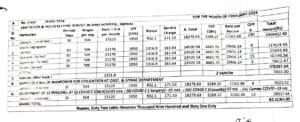There is a sense of questionable and possible resource mismanagement at RIMS as revealed by a document. The Frontier Manipur unmasks possible institutional lapses amidst crisis in the state.
TFM Investigative Team
The crisis in Manipur since May 3, 2024, has thrown a spotlight on institutional failings and malpractices. Amidst this, a new controversy has surfaced surrounding the Regional Institute of Medical Sciences (RIMS) and its service provider, the Centre for Research on Environmental Development (CRED). Documents obtained by The Frontier Manipur reveal perplexing details about the allocation of resources and personnel.

The “Internally Arranged” Conundrum
A key document, a bill forwarded to the Director of RIMS through the Medical Superintendent, highlights an unusual term: “internally arranged.” This phrase appears against the names of seven individuals listed in the bill for February 2024. These individuals are:
- Chingboi (Entry 30, Page 3 as per the scanned copy obtained by TFM)
- Hausianniang (Entry 50, Page 3 as per the scanned copy obtained by TFM)
- Jamgousiam (Entry 62, Page 4 as per the scanned copy obtained by TFM)
- Khanman Paite (Entry 80, Page 5 as per the scanned copy obtained by TFM)
- Kholminchong Kilong (Entry 87, Page 5 as per the scanned copy obtained by TFM)
- Khupminliun Haulai (Entry 94, Page 5 as per the scanned copy obtained by TFM)
- Niangainali Haulai (Entry 182, Page 7 as per the scanned copy obtained by TFM)

While these names, suggest that they belong to either Kuki-Zo communities or are persons hailing from the hill districts, the words “internally arranged” has not been explicitly explained or defined in the same document. The term “internally arranged” lacks any explicit explanation or definition in the document, raising several questions about its implications. Are these individuals employed at RIMS Imphal, or are they deployed elsewhere? If so, where and under what capacity?
Discrepancies in Documentation
The document also seems to indicate formatting irregularities. For instance, page 5 (paging sequence as per the scanned copy obtained by TFM) has an entry for 30 that duplicates the content of page 3 as far as the phrase “internally arranged” is concerned.
The total amount sanctioned in this bill stands at Rs. 62,19,961.00 (Rupees Sixty-Two Lakhs Nineteen Thousand Nine Hundred Sixty-One). While the financial figures are clear, the details regarding these “internally arranged” staff remain opaque.

What Does “Internally Arranged” Signify?
The term possibly could imply:
- Internal Resource Management: Individuals sourced and managed within CRED’s existing workforce rather than through external hiring.
- Temporary or Standby Staff: Personnel kept on call for emergencies or surge demands.
- Flexible Deployment: Workers rotated across CRED projects.
However, if these individuals are not deployed at RIMS Imphal, their exact roles and assignments or places of posting remain unclear, raising suspicions about the justification for their wages.
Broader Implications
This situation highlights potential systemic lapses:
- Transparency Deficit: Ambiguities in the bill raise doubts about the clarity of contractual obligations between RIMS and CRED.
- Accountability Gaps: The lack of clear definitions for terms like “internally arranged” and the absence of deployment details suggest poor documentation and oversight.
- Financial Oversight: Questions arise about whether the sanctioned funds are being utilized effectively.
The Role of CRED
The Centre for Research on Environmental Development (CRED) is a popular registered organization based in Naoremthong Laishram Leirak, Imphal West. Its core activities include:
- Sanitation and Housekeeping: Maintaining hygiene in institutional settings like RIMS.
- Bio-Medical Waste Management: Safe disposal of hazardous waste.
- Manpower Deployment: Providing staff for sanitation and healthcare support.
- Vehicle Management: Operating waste transportation services.
Beyond RIMS, CRED has been consistently engaging in environmental research, community outreach, public health partnerships, waste management programmes, and skill development initiatives. While its contributions to public health and sanitation are notable, this controversy casts a shadow on its operational integrity.
Questions That Demand Answers
The revelations demand a thorough investigation into several critical issues:
- Deployment Clarity: Where are the “internally arranged” staff deployed if not at RIMS?
- Contractual Transparency: What are the terms of the memorandum of understanding between RIMS and CRED?
- Financial Accountability: How are the funds sanctioned to CRED being utilized?
A Call for Scrutiny
The findings underscore the need for rigorous audits and oversight mechanisms to ensure accountability in public institutions. As Manipur continues to grapple with a multifaceted crisis, addressing these lapses is crucial to restoring public trust and ensuring the efficient use of resources, both by private and public institutions.
